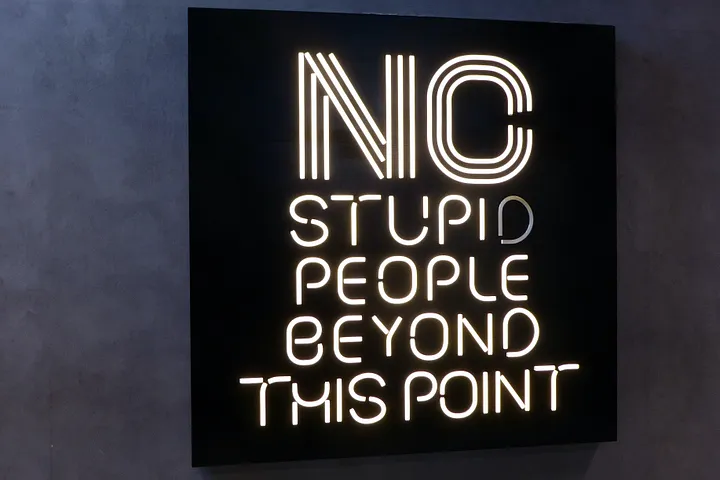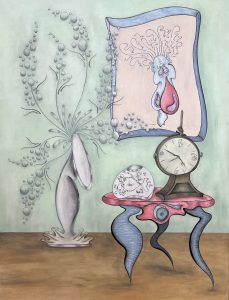Sometimes my brain does not work as well as I would like it to work. I’m sure you have that issue, too. You judge someone hastily. You make a decision that makes things worse. You follow a leader who you learn is not trustworthy. You don’t or can’t recall something clearly. You argue incessantly with Uncle Bob about the last election.
Sure, we all make mistakes. But I will assert until the end of time that mistakes do not make a person “stupid.” I don’t like that word and I don’t like the sentiment. People — all people — are brilliant in their own ways. So, no matter the image above, come on in!
What if some of our mistakes, our misunderstandings, could be avoided entirely?
I bring you the antidote to your poisoned mind. The cure for your disease. The peace offering for Thanksgiving dinner. I give you Cognitive Biases.
COGNITIVE BIASES: OUR MONKEY BRAIN IS IN CONTROL
Cognitive biases are systematic patterns of deviation of rationality in judgment, whereby inferences about other people and situations are drawn in an illogical fashion.
I just lost half of my readers with that definition.
Cognitive biases are ways we believe we are thinking logically and rationally, but we are doing just the opposite. These illogical patterns of thinking dictate behaviors and cause the person to have distorted perception, illogical interpretation and, most dangerously, inaccurate judgments.

YOU ARE NOT STUPID
Cognitive biases, therefore, result in a twisted construction of reality. People support unsupportable causes. People seek opinions that echo what they want to hear instead of searching for facts. People make inaccurate business or personal decisions. People recall things inaccurately. And all because we are humans and our brains are imperfect. You are not stupid. Neither is that guy on Twitter. We are flawed humans.
Over millions of years of evolution, we tried to make conclusions and use what we learned in similar situations. For example, we eat one of those green berries and we get sick. We have another green berry a few days later and get sick. Our cave-neighbor has one, and she gets sick. Hmmm… perhaps those berries make you sick?
But when we use that reactive survival tool on complex analysis, we fail.
Because cognitive biases once helped us survive, the tendency to rely on them is powerful. We call these mental shortcuts heuristics. When a problem-solving strategy works, and we use it again on similar problems. Although heuristics can be helpful in survival situations and snap running-from-ravenous wild-animal decisions, using those same shortcuts to address other complex situations is problematic.
If we extend the berry example, we might conclude all berries are dangerous. Or green things are dangerous. Or when our neighbor eats something that we did, our neighbor cursed us and the food. Our conclusions can get out of hand. When we attempt to understand the complex world quickly, we shortcut our processing, perceive incorrectly, make inaccurate assumptions or decisions, and behave less effectively than if we had critically examined the information and situation. Does this sound familiar? It should.
Psychologically, we deeply fear being wrong. Millions of years ago, hell, even today, being wrong meant or means death. Heuristics and biases are brain functions that survived and that we inherited through evolution. We do not want to harm our fragile egos or to have problems or to experience anything negative. Psychologists even termed our desire to think of only pleasant things as the Pollyanna principle.
We also want a stable existence. Humans also seek mental and behavioral consistency. It helps us understand the world around us. Predictability equates to survival. Once we form an idea, or a belief or an opinion, we hold on to it for dear life! (Literally.)
Our tendency toward cognitive biases also may be due to limitations of the brain: Many people can entertain only one thought at a time — and considering two possibilities simultaneously is cognitively stressful if not impossible. This inability is strengthened by another cognitive bias: confirmation bias. We will continue to select evidence that confirms what we already think — and avoid evidence that contradicts with what we think. Scientists know that even those who are cognitively complex, and are more likely to identify their own cognitive biases and eliminate them, still have cognitive biases. It happens to us all: smart, not so smart, old, young, politician and priest. It’s a symptom of the human condition.
We also do not intentionally perform biases. Biases are unconsciousshortcuts to help us think quickly. We also want life easy (research and thinking are hard) and we believe, without question, what someone we respect and consider powerful tells us. Although we are fearing being wrong, those in power rely upon our frailty and use confirmation bias — and other cognitive biases — against us. This is what we should really fear.
The over 130 distinct biases are divided into three classifications of errors. Those errors we make when (1) evaluating or judging something or someone; (2)making decisions; and (3) accessing memory.
Let’s look at an example of a memory bias: Confabulation.

CONFABULATION
Memory cognitive biases, or memory errors, are errors in recall which affect the time it takes the person to remember, the accuracy of the person’s memory, or the possibility the person remembers at all. Or all three.
Imagine how memory issues can affect decision-making? Even if the person is attempting to use central processing or reason, he or she will be using flawed information. Memory errors can either be ones of omission, forgetting, or commission, remembering incorrectly.
Confabulation, or The Mandela Effect, is a favorite memory bias among my students. It’s easy to remember and to guard against. It’s the tendency to produce fabricated, distorted, or warped memories without the conscious intention to deceive yourself or others. We consider it a type of false memoryor false recall.
It’s called The Mandela Effect because people recalled South African President and Revolutionary, Nelson Mandela, dying in prison when he actually died in 2013. The media never reported his death in the 1980s, but that’s what people recall. In college, I had an argument with a professor when I insisted Nelson was alive and well and the sitting President of South Africa. (Which is how I learned about this particular bias.)
Other examples which are more humorous than fraught with conflict:
- People all over the world enjoyed The Berenstain Bears books — but most recall the family as the Berenstein Bears.
- It’s NOT Sex in the City. It’s Sex and the City.
- Most people remember Humphrey Bogart’s famous Play it again, Samline in Casablanca. But he never says it. He says, Play it. See for yourself (around 1:55).
- In Star Wars, the line recalled as Luke, I am your father, Vader actually says: No, I am your father. See for yourself (around 1:55).
You can read about 45 other examples here.
When others recall the same information incorrectly, the social proof (another bias, by the way) reinforces the erroneous memory. Not every confabulation is as cute as the Vader line confusion. What if you recall your boss saying one thing and he said another? What if you remember a person as a criminal but he or she was never charged nevermind guilty? What if the witness swears you were the one holding the gun? And that’s how confabulation becomes societally dangerous.
We know, psychologically, what perpetuates cognitive biases, so we’ll take a look at that in my next article on May 26th. I hope with this series you can think clearly and help others do the same. Please share!



